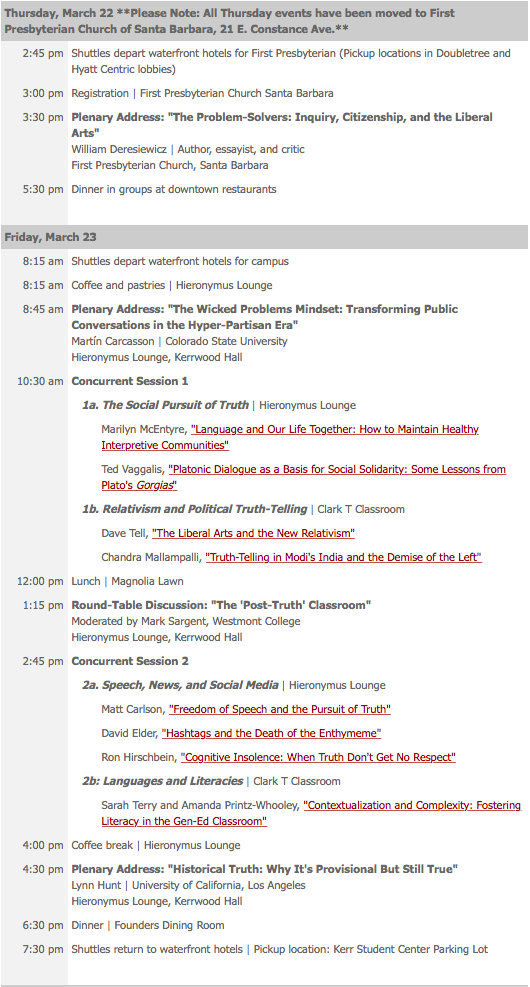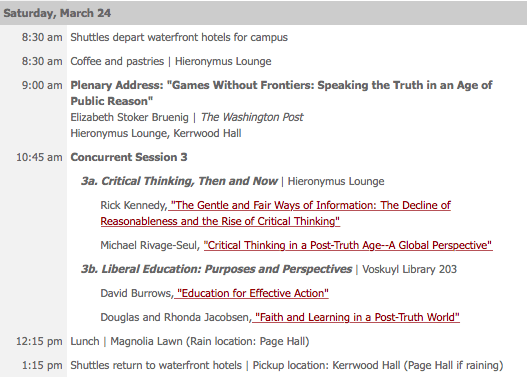
How can liberal education help us navigate the changing landscape of knowledge?
We live in a moment when disputes about knowledge and truth—always at home in the academy—have broken out dramatically into our wider society. Shared sources of information and standards for credibility seem to have evaporated. Once-esteemed academic institutions, scientific enterprises, and media organizations are routinely dismissed as politicized engines of propaganda. Trust in the expertise, the professionalism, and the simple good faith of those with differing views seems increasingly rare.
How did we get here, and what is our way forward? Can the fragmentation of our society into closed and competing information camps be repaired? Can trust in shared sources of information be restored? What pedagogical practices or curricular strategies nurture a critical spirit without engendering mistrust and insularity? And what contribution should the liberal arts enterprise make in this moment?
Join us to explore these questions and more at the Gaede Institute’s seventeenth annual Cnversation on the Liberal Arts, "Knowledge in Crisis: Liberal Learning in a 'Post-Truth' Age." And contribute to the conversation with your own scholarship by responding to our Call for Proposals. We look forward to seeing you at Westmont College in Santa Barbara next March.
Who should attend?
- Scholars from any discipline whose work explores knowledge, truth, facts, information, argument and related concepts--their creation, their critique, their dissemination, their use and abuse--and artists exploring these issues in their creative work.
- Academic administrators and faculty exploring curricular and pedagogical strategies for fostering healthy critical--and self-critical--skills;
- Scientists, journalists, and others engaged in public discourse about sometimes polarizing topics;
- Undergraduate or graduate students who are emerging scholars of these issues or practitioners in these areas;
- Anyone with an interest in the value and practice of liberal education.
William Deresiewicz | Author and Essayist
William Deresiewicz is an award-winning essayist and critic. He is the author the New York Times bestseller Excellent Sheep: The Miseducation of the American Elite and the Way to a Meaningful Life, as well as numerous articles, including recently "In Defense of Facts" for The Atlantic and "On Political Correctness" for The American Scholar.

Lynn Hunt | UCLA
Lynn Hunt is a Distinguished Research Professor in history at UCLA. A specialist in the French Revolution, Dr. Hunt has undertaken wide-ranging examinations of human rights, time, religious pluralism, and historiography. Among her many books are Writing History in the Global Era, Inventing Human Rights, and Telling the Truth About History.

Martín Carcasson | Colorado State University
Martín Carcasson is a professor of communication studies at Colorado State University and the founder of CSU's Center for Public Deliberation, an interdisciplinary center that prepares students for practical engagement in deliberative democracy. His extensive research with the Kettering Foundation's Deliberative Democracy Consortium includes, most recently, a report titled "Process Matters: Human Nature, Democracy, and a Call for Rediscovering Wisdom."

Elizabeth Stoker Bruenig | The Washington Post
Elizabeth Stoker Bruenig is an assistant editor and opinion columnist at The Washington Post. She has also served as a staff writer at The New Republic, and has contributed articles to a wide range of periodicals including The Atlantic, The American Conservative, and Jacobin Magazine. She has done graduate work in religion at Cambridge University and Brown University.
| Concurrent Session 1 |
1a. The Social Pursuit of Truth | Hieronymus Lounge |
|
Marilyn McEntyre, "Language and Our Life Together: How to Maintain Healthy Interpretive Communities" |
|
Ted Vaggalis, "Platonic Dialogue as a Basis for Social Solidarity: Some Lessons from Plato's Gorgias" |
1b. Relativism and Political Truth-Telling | Clark T Classroom |
|
Dave Tell, "The Liberal Arts and the New Relativism" |
|
Chandra Mallampalli, "Truth-Telling in Modi's India and the Demise of the Left" |
| Concurrent Session 2 |
2a. Speech, News, and Social Media | Hieronymus Lounge |
|
Matt Carlson, "Freedom of Speech and the Pursuit of Truth" |
|
David Elder, "Hashtags and the Death of the Enthymeme" |
|
Ron Hirschbein, "Cognitive Insolence: When Truth Don't Get No Respect" |
2b: Languages and Literacies | Clark T Classroom |
|
Sarah Terry and Amanda Printz-Whooley, "Contextualization and Complexity: Fostering Literacy in the Gen-Ed Classroom" |
| Concurrent Session 3 |
3a. Critical Thinking, Then and Now | Hieronymus Lounge |
|
Rick Kennedy, "The Gentle and Fair Ways of Information: The Decline of Reasonableness and the Rise of Critical Thinking" |
|
Michael Rivage-Seul, "Critical Thinking in a Post-Truth Age--A Global Perspective" |
3b. Liberal Education: Purposes and Perspectives | Voskuyl Library 203 |
|
David Burrows, "Education for Effective Action" |
|
Douglas and Rhonda Jacobsen, "Faith and Learning in a Post-Truth World" |
Elizabeth Bruenig, "Games Without Frontiers: Speaking the Truth in an Age of Public Reason"
Saturday, March 23
Friday, March 23
Lynn Hunt, "Historical Truth: Why It's Provisional But Still True"
Friday, March 23



